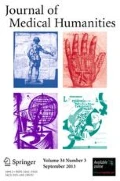Abstract
A purely deductive medical ethics cannot properly account for the varieties of circumstances which arise in medical practice. By contrast, a purely inductive medical ethics lacks sufficient guidance from ethical principles. In resolving ethical dilemmas in medicine, most often an appeal is made to middle-level axioms and methodological rules to mediate between theory and practice. I argue that this appeal must be augmented by considerations of context, such considerations, in effect, constituting a moral rule based on the social structure of medical practice. A contextual grid is proposed which assists the process of weighing values in resolving cases.
Similar content being viewed by others
References
Ackerman, R.F. What bioethics should be.Journal of Medicine and Philosophy, 5 1980, 260–275.
Beauchamp, T., & Childress, J.Principles of Biomedical Ethics. New York: Oxford University Press, 1979.
Belmont Report of the National Commission for the Protection of Human Subjects. Washington, D.C.: U.S. Government Printing Office, 1978. DHEW (OS) 78-0012.
Bergsma, J. & Duff, R. A model for examining values and decision making in the patient-doctor relationship.Pharos, 1980, summer, 7–12
Bergsma, J. & Thomasma, D.Health care: its Psychosocial Dimensions. Pittsburgh: Duquesne University Press, 1982.
Callahan, D. Shattuck lecture: contemporary biomedical ethics.New England Journal of Medicine 1980,22 300–306.
Crane, D. Physician's attitudes toward the treatment of critically ill patients. In S.J. Reiser, A. Dyck, and W. Curran (Eds.),Ethics In Medicine. Cambridge, MA.: MIT Press, 1978, pp. 514–517.
Dyck, A. Ethics in medicine. In S.J. Reiser, A. Dyck, and W. Curran (Eds.),Ethics In Medicine. Cambridge, MA.: MIT Press, 1978, pp. 115–119.
Graber, G. On paternalism and health care. In J.W. Davis, B. Hoffmaster, and S. Shorten (Eds.),Contemporary Issues in Biomedical Ethics. Clifton, J.J.: The Humana Press, 1978, pp. 233–244.
Gorovitz, S. & MacIntyre, A. Toward a theory of medical fallibility.Journal of Medicine and Philosophy 1976,1 51–71.
Hare, R.M. Can the moral philosopher help? In H.T. Engelhardt, Jr. and S. Spicker (Eds.),Philosophical Medical Ethics. Dordrecht & Boston: D. Reidel, 1977, pp. 46–61.
Ingelfinger, F. Bedside ethics for the hopeless case.New England Journal of Medicine 1973,289 914.
MacIntyre, A. How virtues become vices: values, medicine and social context. In H.T. Engelhardt, Jr., and S. Spicker (Eds.),Evaluation and Explanation in the Biomedical Sciences. Dordrecht & Boston: D. Reidel, 1975, pp. 97–112.
MacIntyre, A. Patients as agents. In H.T. Engelhardt, Jr. and S. Spicker (Eds.),Philosophical Medical Ethics. Dordrecht & Boston: D. Reidel, 1977, pp. 197–212.
MacIntyre, A. Why is the search for the foundations of ethics so frustrating?Hastings Center Report 1979,9 16–22.
Mill, J.S. Dr. Whewell on moral philosophy. In J.B. Schnewind (Ed.),Mill's Ethical Writings. New York: Macmillan, 1965, p. 178.
Pellegrino, E.D., & Thomasma, D.C.A Philosophical Basis of Medical Practice. New York: Oxford University Press, 1981.
Pellegrino, E.D. Towards a reconstruction of medical morality: the primacy of the act of profession and the fact of illness.Journal of Medicine and Philosophy 1979,4 32–56.
Rachels, J. Medical ethics and the rule against killing: comments on professor Hare's paper. In H.T. Engelhardt, Jr. and S. Spicker (Eds.),Philosophical medical ethics. Dordrecht & Boston: D. Reidel, 1977, pp. 63–72.
Ramsey, P. The case of the curious exception. In G. Outka and P. Ramsey (Eds.),Norm and Context in Christian Ethics. New York: Charles Scribners & Sons, 1968, p. 78.
Ramsey, P.The patient as person. New Haven: Yale University Press, 1973.
Ruddick, W. Can doctors and philosophers work together?Hastings Center Report 1981,11 12–17.
Siegler, M. Cautionary advice for humanists.Hastings Center Report 1981,11 19–20.
Thomasma, D.C. & Pellegrino, E.D. The philosophy of medicine as source of medical ethics.Metamedicine 1980,2 5–11.
Thomasma, D.C. Beyond medical paternalism and patient autonomy: a model of physician's conscience for the doctor-patient relationship.Annals of Internal Medicine 1983,98 243–248.
Thomasma, D.C. The limitations of the autonomy model for the doctor-patient relationship.The Pharos, in press.
Thomasma, D.C. The possibility of a normative medical ethics.Journal of Medicine and Philosophy 1980,5 249–259.
Thomasma, D.C. Training in medical ethics: and ethical workup.Forum on Medicine 1978,1 Dec., 33–36.
Veatch, R. Professional medical ethics: the grounding of its principles.Journal of Medicine and Philosophy 1979,4 1–19.
Author information
Authors and Affiliations
Rights and permissions
About this article
Cite this article
Thomasma, D.C. The context as a moral rule in medical ethics. J Med Hum 5, 63–79 (1984). https://doi.org/10.1007/BF01103648
Issue Date:
DOI: https://doi.org/10.1007/BF01103648




